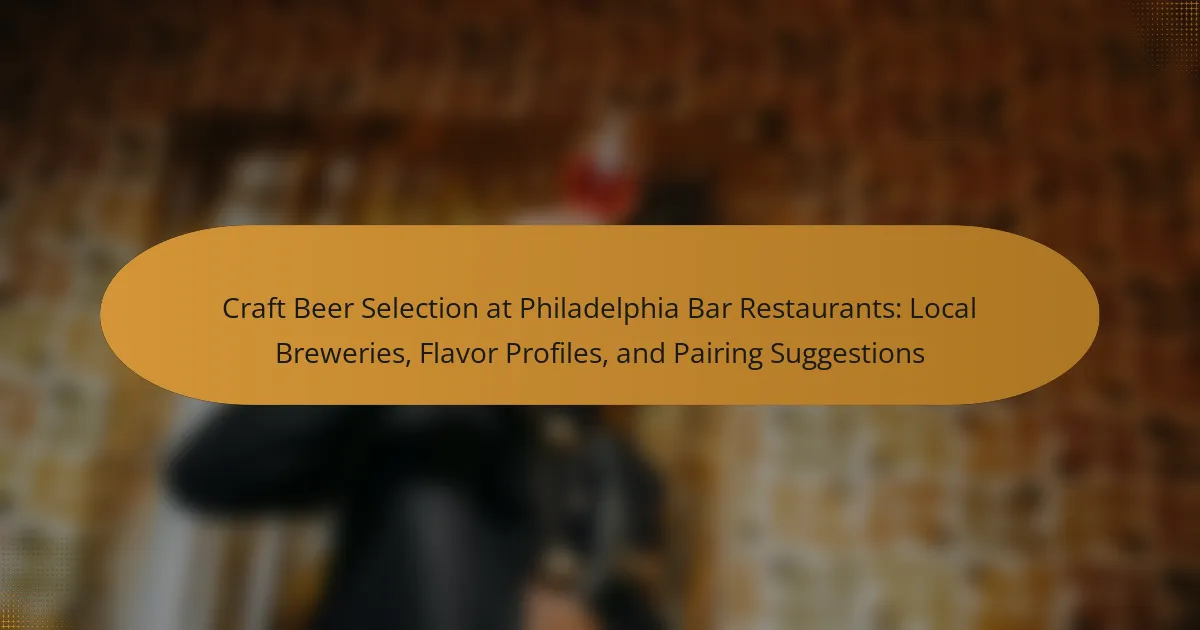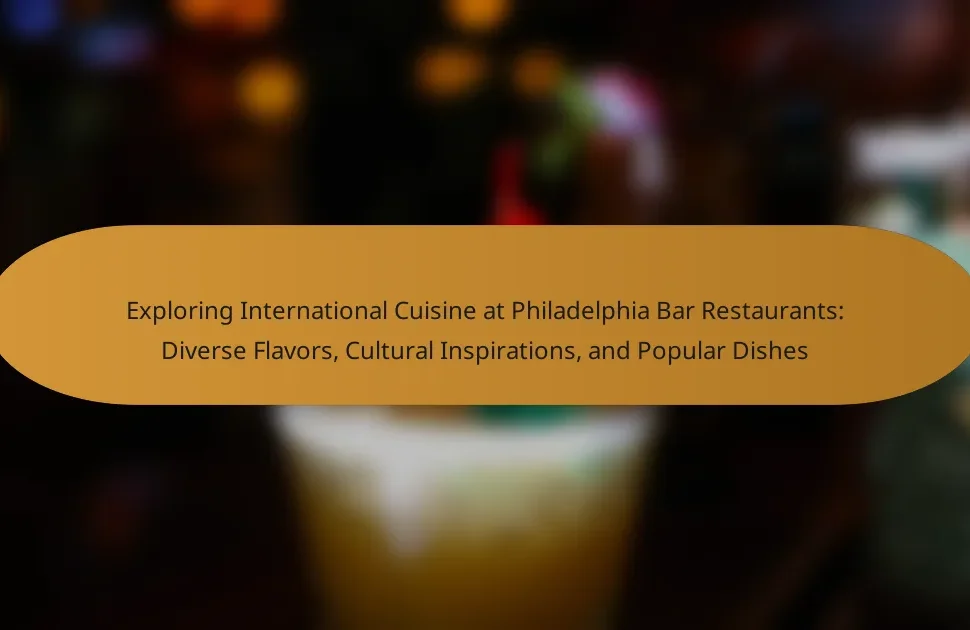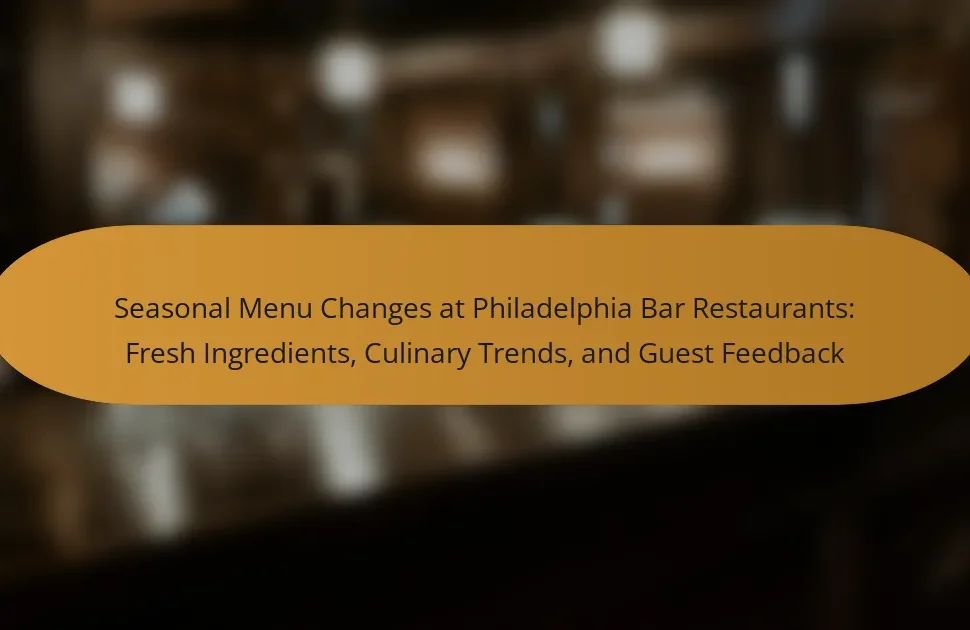
What is the craft beer selection at Philadelphia bar restaurants?
Philadelphia bar restaurants offer a diverse selection of craft beers. These establishments frequently feature local breweries such as Yards Brewing Company, Victory Brewing Company, and Troegs Independent Brewing. The craft beer selection includes a variety of styles like IPAs, stouts, and lagers. Seasonal and limited-edition brews are often available, enhancing the variety. Many bars also rotate their taps to showcase new offerings. This dynamic selection reflects the city’s vibrant craft beer scene. Additionally, food pairings are often suggested to complement the flavors of the beers. Overall, the craft beer selection in Philadelphia is extensive and continually evolving.
How do local breweries contribute to this selection?
Local breweries enhance the craft beer selection at Philadelphia bar restaurants by providing unique, locally-produced options. They create diverse flavor profiles that appeal to various tastes. These breweries often experiment with local ingredients, resulting in distinctive beers. This local sourcing fosters community engagement and supports the regional economy. Many Philadelphia bar restaurants prioritize these local brews to showcase their commitment to the community. Additionally, local breweries frequently collaborate with restaurants for exclusive beer releases. This collaboration can lead to innovative pairings that enhance the dining experience. The presence of local breweries contributes to a vibrant craft beer culture in Philadelphia.
What are some notable local breweries in Philadelphia?
Notable local breweries in Philadelphia include Yards Brewing Company, Victory Brewing Company, and Philadelphia Brewing Company. Yards Brewing Company is known for its signature ales, such as the Philadelphia Pale Ale. Victory Brewing Company offers a variety of craft beers, including the popular Golden Monkey. Philadelphia Brewing Company specializes in traditional styles and locally sourced ingredients. These breweries contribute significantly to the local craft beer scene. They provide a range of flavors that appeal to diverse palates. Each brewery has a unique history and brewing philosophy. This diversity enhances the craft beer selection in Philadelphia’s bar restaurants.
What unique attributes do these breweries offer?
Local breweries in Philadelphia offer unique attributes such as distinct flavor profiles and innovative brewing techniques. Many utilize locally sourced ingredients, enhancing freshness and regional character. Some breweries focus on experimental styles, like barrel-aging or sour beers, setting them apart from mainstream options. Others may provide limited-edition brews or seasonal releases, attracting craft beer enthusiasts. Community engagement is also a key attribute, with breweries often hosting events and collaborations with local artists. Additionally, some breweries emphasize sustainability practices in their operations. These unique attributes contribute to a vibrant craft beer culture in Philadelphia.
What flavor profiles can be found in Philadelphia craft beers?
Philadelphia craft beers feature a diverse range of flavor profiles. Common profiles include hoppy, malty, fruity, and sour flavors. Hoppy beers often present citrus and pine notes, typical of IPAs. Malty varieties can offer caramel and toffee undertones, found in many stouts and porters. Fruity flavors may include tropical fruits or berries, especially in wheat beers and sours. Additionally, some craft beers showcase unique spices or herbs, enhancing their complexity. The variety reflects the city’s vibrant brewing scene and innovation among local breweries.
How do different brewing techniques affect flavor profiles?
Different brewing techniques significantly influence flavor profiles in beer. Techniques such as boiling time, fermentation temperature, and type of yeast used alter the final taste. For example, longer boiling times can enhance bitterness and caramelization. Higher fermentation temperatures often produce fruity esters, while lower temperatures yield cleaner flavors. The choice of hops and their timing during brewing affects aroma and bitterness levels. Additionally, methods like dry hopping can impart fresh hop flavors. Each technique interacts with ingredients uniquely, shaping the overall sensory experience of the beer.
What are the common flavor notes in Philadelphia craft beers?
Common flavor notes in Philadelphia craft beers include citrus, pine, caramel, and toasty malt. Many craft brewers in Philadelphia emphasize hop-forward profiles. Citrus notes often come from hops like Citra and Mosaic. Pine flavors can be attributed to varieties such as Simcoe and Chinook. Caramel notes typically derive from the use of specialty malts. Toasty malt flavors enhance the complexity of darker beers. Additionally, some beers may feature hints of chocolate or coffee. These flavor notes reflect the diverse brewing styles found in the region.
How can craft beer pairings enhance dining experiences?
Craft beer pairings can enhance dining experiences by complementing and elevating food flavors. The unique profiles of craft beers can match the taste components of various dishes. For example, a hoppy IPA can balance spicy foods, while a rich stout can enhance chocolate desserts. Studies show that pairing specific beer styles with food improves overall satisfaction. According to the Brewers Association, 80% of craft beer consumers enjoy pairing beer with meals. This practice encourages exploration of flavors and promotes local breweries. Craft beer pairings can also create a more engaging dining atmosphere.
What foods pair well with specific craft beer styles?
IPAs pair well with spicy foods. The hoppy bitterness complements heat and enhances flavors. Pairing IPAs with spicy chicken wings or Thai curry works effectively. Stouts match well with rich desserts. The roasted malt flavors enhance chocolate and coffee notes. Pairing stouts with chocolate cake or espresso brownies is a popular choice. Wheat beers complement light salads and seafood. Their refreshing nature balances citrusy dressings and delicate flavors. Pairing wheat beers with grilled shrimp or a Caesar salad is recommended. Amber ales work well with grilled meats. Their malt sweetness enhances the savory flavors of barbecue. Pairing amber ales with burgers or ribs is common practice.
How do pairing suggestions vary by season or occasion?
Pairing suggestions for craft beer vary significantly by season and occasion. Seasonal beers often reflect the flavors and ingredients available during specific times of the year. For example, summer pairings typically include lighter beers like wheat ales, which complement fresh salads and seafood. In contrast, winter pairings often feature darker beers, such as stouts or porters, which go well with hearty dishes like stews and roasted meats.
Occasion-based pairings also play a crucial role. During holidays, specific styles are favored, such as pumpkin ales in fall for Thanksgiving, or spiced beers during winter festivities. Moreover, events like barbecues may call for IPAs that enhance grilled flavors, while formal dinners might pair well with lagers or Belgian ales that elevate the dining experience.
These trends are supported by consumer preferences and seasonal brewing practices, which highlight the importance of matching beer styles with food and seasonal themes for optimal enjoyment.

What are the trends in craft beer selection at Philadelphia bar restaurants?
Trends in craft beer selection at Philadelphia bar restaurants include a focus on local breweries, innovative flavor profiles, and seasonal offerings. Many establishments prioritize sourcing beers from nearby breweries to support local economies. This has led to a diverse range of styles being available, from IPAs to stouts. Flavor experimentation is also prominent, with bars featuring unique ingredients such as fruits and spices. Seasonal selections reflect local tastes and ingredients, enhancing the dining experience. Additionally, there is a growing interest in sustainable brewing practices among Philadelphia bars. This trend aligns with consumer demand for environmentally friendly options. Overall, the craft beer scene in Philadelphia is vibrant and continually evolving.
How is the craft beer scene evolving in Philadelphia?
The craft beer scene in Philadelphia is experiencing significant growth and diversification. New breweries are emerging, contributing to a vibrant local landscape. As of 2023, there are over 100 breweries in the Philadelphia area. This increase reflects a rising consumer interest in unique and locally sourced flavors.
Moreover, breweries are experimenting with innovative ingredients and brewing techniques. Many are focusing on sustainability and community engagement. Events like beer festivals and tap takeovers are becoming more frequent, showcasing local talent. The collaboration among breweries is also on the rise, leading to unique limited-edition beers.
This evolution is supported by a growing number of craft beer bars and restaurants that emphasize local offerings. The Philadelphia craft beer scene is not only expanding in quantity but also in quality and variety.
What new breweries or styles are gaining popularity?
New breweries and styles gaining popularity include hazy IPAs and sour ales. Hazy IPAs are known for their juicy, fruity flavors and cloudy appearance. They have surged in popularity due to their smooth mouthfeel and low bitterness. Sour ales, particularly those brewed with fruit, are also trending. These beers offer a unique tartness that appeals to adventurous drinkers. The rise of these styles can be seen in local Philadelphia breweries, which are experimenting with innovative brewing techniques. Additionally, the craft beer market has reported a 20% increase in sales for these styles over the past year. This trend reflects a growing consumer preference for diverse and flavorful beer options.
How do consumer preferences influence craft beer offerings?
Consumer preferences significantly shape craft beer offerings. Breweries adapt their products based on local tastes and trends. Popular flavor profiles, such as IPAs and stouts, often dominate menus. Seasonal preferences also drive breweries to create limited-edition brews. Market research indicates that consumers favor unique ingredients and innovative brewing techniques. Additionally, consumer feedback influences recipe adjustments and new product development. Craft beer festivals and tastings provide insights into emerging trends. This responsiveness helps breweries stay competitive and relevant in the market.
What role do events and festivals play in craft beer selection?
Events and festivals significantly influence craft beer selection. They provide opportunities for breweries to showcase their products. Attendees can sample a variety of beers in one location. This exposure helps consumers discover new flavors and styles. Festivals often feature limited-edition or seasonal brews. These unique offerings encourage attendees to try something different. Events also facilitate direct interaction between brewers and consumers. This interaction fosters brand loyalty and informed choices. According to the Brewers Association, craft beer festivals attract thousands of attendees annually, boosting local brewery visibility.
What are some key craft beer events in Philadelphia?
Philadelphia hosts several key craft beer events throughout the year. The Philadelphia Craft Beer Festival is a notable event, showcasing over 100 breweries and offering tastings. Another significant event is the Philly Beer Week, which lasts for ten days and includes various beer-related activities across the city. The Great American Beer Festival also features Philadelphia breweries and attracts beer enthusiasts nationwide. Additionally, the Craft Brewers Conference brings industry professionals together for networking and education. These events highlight Philadelphia’s vibrant craft beer scene and promote local breweries.
How do these events showcase local breweries and their products?
Local breweries are showcased at events through tastings and product displays. These events allow breweries to present their unique beer varieties. Attendees can sample different flavors and styles directly from the source. Breweries often share the brewing process and ingredients used. This interaction enhances consumer knowledge and appreciation. Events may also feature brewery representatives for direct engagement. Local food pairings are often included to highlight beer compatibility. These experiences promote community support for local businesses.

What practical tips can enhance your craft beer selection experience?
To enhance your craft beer selection experience, consider exploring local breweries in Philadelphia. Local breweries often offer unique flavors not found in mass-produced beers. Familiarize yourself with different beer styles, such as IPAs, stouts, and sours. Understanding these styles helps in making informed choices. Engage with bartenders or staff for recommendations based on your taste preferences. They can provide insights into seasonal offerings and limited releases. Attend tasting events to sample various beers and discover new favorites. This hands-on approach enriches your understanding of flavor profiles. Lastly, keep notes on the beers you try. Documenting your experiences aids in refining your future selections.
How can you choose the best craft beer for your meal?
To choose the best craft beer for your meal, consider the flavor profile of both the food and the beer. Pairing complementary flavors enhances the dining experience. For example, a hoppy IPA can balance spicy dishes. Malty stouts work well with rich, chocolate desserts. Additionally, consider the beer’s body; lighter beers suit lighter meals. Conversely, heavier beers match well with robust flavors. Local breweries often craft unique styles that reflect regional tastes. Exploring these options can lead to delightful pairings. Ultimately, personal preference plays a significant role in selection.
What should you consider when selecting a beer to pair with food?
Consider the flavor profile of the beer and the food when selecting a beer to pair with food. Match complementary flavors to enhance the dining experience. For example, hoppy beers can balance spicy dishes. Malty beers pair well with rich, savory foods. The beer’s carbonation can cleanse the palate between bites. Also, consider the beer’s body; lighter beers work with lighter fare, while heavier beers suit hearty meals. Lastly, regional styles may reflect local food traditions, enriching the pairing.
How can you explore new flavors and styles effectively?
To explore new flavors and styles effectively, start by sampling a variety of craft beers. Visiting local breweries in Philadelphia offers unique options. Each brewery typically has its own flavor profile and brewing techniques. Engage with staff to learn about their specialties and recommendations. Participating in beer tastings can enhance your understanding of different styles. Pairing beers with complementary foods can also highlight their flavors. Keeping notes on your preferences helps refine future choices. Researching online resources about local breweries can provide insights into seasonal offerings and new releases.
Craft beer selection at Philadelphia bar restaurants highlights a diverse array of locally produced options from notable breweries like Yards Brewing Company and Victory Brewing Company. The article examines the variety of craft beer styles available, including IPAs, stouts, and seasonal brews, while emphasizing the unique flavor profiles and brewing techniques that characterize Philadelphia’s craft beer scene. Additionally, it explores how local breweries contribute to the community and offers pairing suggestions to enhance the dining experience. Trends in consumer preferences, events, and festivals further illustrate the evolving landscape of craft beer in Philadelphia.




